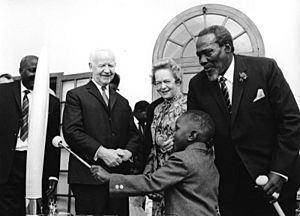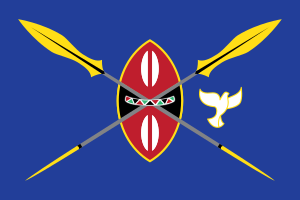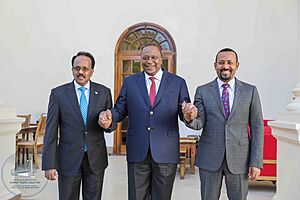Uhuru Kenyatta facts for kids
Quick facts for kids
Uhuru Kenyatta
CGH
|
|
|---|---|
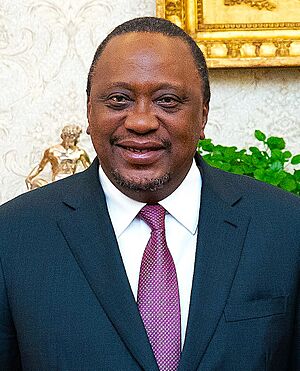
Kenyatta in 2020
|
|
| 4th President of Kenya | |
| In office 9 April 2013 – 13 September 2022 |
|
| Deputy | William Ruto |
| Preceded by | Mwai Kibaki |
| Succeeded by | William Ruto |
| Deputy Prime Minister of Kenya | |
| In office 13 April 2008 – 9 April 2013 Serving with Musalia Mudavadi
|
|
| President | Mwai Kibaki |
| Minister of Finance | |
| In office 23 January 2009 – 26 January 2012 |
|
| Prime Minister | Raila Odinga |
| Preceded by | John Michuki |
| Succeeded by | Robinson Michael Githae |
| Minister of Trade | |
| In office 13 April 2008 – 23 January 2009 |
|
| Prime Minister | Raila Odinga |
| Preceded by | Mukhisa Kituyi |
| Succeeded by | Amos Kimunya |
| Minister of Local Government | |
| In office 8 January 2008 – 13 April 2008 |
|
| President | Mwai Kibaki |
| Preceded by | Musikari Kombo |
| Succeeded by | Musalia Mudavadi |
| Leader of the Opposition | |
| In office 1 January 2003 – 30 December 2007 |
|
| Preceded by | Mwai Kibaki |
| Member of Parliament for Gatundu South |
|
| In office 9 January 2003 – 28 March 2013 |
|
| Preceded by | Moses Mwihia |
| Succeeded by | Jossy Ngugi |
| Personal details | |
| Born |
Uhuru Muigai Kenyatta
26 October 1961 Nairobi, Kenya Colony |
| Political party | Kenya African National Union (Before 2012) The National Alliance (2012–2016) Jubilee (2016–present) |
| Other political affiliations |
Jubilee Alliance (2013–2016) |
| Spouse |
Margaret Gakuo
(m. 1991) |
| Children | Jomo Kenyatta, Ngina Kenyatta, Jaba Kenyatta |
| Parents |
|
| Education | Amherst College (BA) |
| Signature | |
| Website | (archived) |
Uhuru Muigai Kenyatta (born 26 October 1961) is a Kenyan politician. He served as the fourth president of Kenya from 2013 to 2022. Before becoming president, he was the Deputy Prime Minister from 2008 to 2013. His father, Jomo Kenyatta, was Kenya's first president.
Kenyatta is married to Margaret Gakuo Kenyatta.
He was chosen by former President Daniel Arap Moi as his preferred successor. However, he lost the 2002 election to Mwai Kibaki. Kenyatta served as a Member of Parliament (MP) for Gatundu South from 2002 to 2013. He was also Deputy Prime Minister alongside Raila Odinga from 2008 to 2013.
Currently, he is a member and leader of the Jubilee Party of Kenya. He was previously part of the Kenya Africa National Union (KANU), which led Kenya to independence. In 2012, he joined The National Alliance (TNA). This party helped him win the 2013 election. Later, TNA merged with the United Republican Party (URP) to form the Jubilee Party.
Kenyatta was re-elected for his second term in August 2017. He won with 54% of the votes. The election results were challenged by his main opponent, Raila Odinga, in the Supreme Court of Kenya. On 1 September 2017, the court said the election was not valid. A new election was held on 26 October, which he won again.
Contents
Early Life and Education
Uhuru Kenyatta was born on 26 October 1961. His parents were Jomo Kenyatta, Kenya's first president, and Mama Ngina Kenyatta. He is the second child in his family. He has two sisters, Christine and Anna, and a brother, Muhoho.
His family belongs to the Kikuyu people, an ethnic group in Kenya. His name "Uhuru" means "freedom" in the Swahili language. He was given this name because Kenya was about to become independent. Uhuru went to St Mary's School in Nairobi. He also worked briefly as a bank teller.
After school, Uhuru studied economics and political science at Amherst College in the United States. When he finished college, he returned to Kenya. He started a company called Wilham Kenya Limited. This company bought and sold farm products.
Beginning in Politics
In 1999, President Daniel Arap Moi appointed Uhuru to lead the Kenya Tourism Board. In 2001, he became a Member of Parliament. He also joined the Cabinet as Minister for Local Government. Even though he was new to politics, Moi wanted him to be his successor.
Kenyatta ran for president in the December 2002 election. He was the candidate for KANU. However, he lost to Mwai Kibaki. After this, he became the Leader of the Opposition in Parliament.
In 2007, he supported Mwai Kibaki for re-election. In January 2008, Kibaki made him Minister of Local Government. Then, in April 2008, he became Deputy Prime Minister and Minister of Trade. This was part of a new government that shared power.
Uhuru Kenyatta was Minister of Finance from 2009 to 2012. He remained Deputy Prime Minister during this time. He introduced new ways for the government to manage money.
Legal Challenges and Cooperation
Before he became president, Uhuru Kenyatta faced legal challenges from the International Criminal Court (ICC). These challenges were related to events that happened after the 2007 elections. He was accused of being involved in violence that followed the elections. About 1300 lives were lost during this time. Uhuru always said he was innocent and wanted to clear his name.
In March 2011, he was asked to appear before the ICC. He went to The Hague in April 2011. He denied any links to illegal groups. He said that other political leaders should take responsibility for the violence.
In January 2012, the ICC confirmed the cases against Kenyatta. However, serious concerns were raised about the evidence. Some witnesses disappeared or died. Because of this, the charges against him were eventually dropped in March 2015. Uhuru Kenyatta cooperated with the court throughout the process.
Political Journey and Elections
In the 1997 election, Uhuru Kenyatta tried to win the Gatundu South Constituency seat. This seat was once held by his father. But he lost to Moses Mwihia.
In 1999, Moi appointed Uhuru to lead the Kenya Tourism Board. In 2001, he became a Member of Parliament. He also joined the Cabinet as Minister for Local Government. He was later elected as the First Vice Chairman of KANU.
In 2002, President Moi supported Uhuru Kenyatta to be KANU's presidential candidate. This caused many people to leave the party. Uhuru came in second in the General Elections, losing to Mwai Kibaki. He then became the Leader of the Opposition.
In 2005, Uhuru became the chairman of KANU. He led his party in campaigns against a new draft constitution. They teamed up with another party to form the Orange Democratic Movement. This led to the draft constitution being rejected.
In 2007, he joined a group called the Party of National Unity (PNU). This group supported President Mwai Kibaki for re-election. PNU won the election, but there were disputes. This led to a crisis in Kenya.
To end the crisis, Kibaki and Raila Odinga agreed to share power. Kibaki remained president, and Odinga became Prime Minister. Uhuru Kenyatta was chosen as Deputy Prime Minister and Minister for Finance.
On 13 September 2007, Uhuru Kenyatta decided not to run for president himself. He supported Kibaki instead. After the election, he was appointed Minister for Local Government. In April 2008, he became Deputy Prime Minister and Minister of Trade. He was later moved to Minister for Finance in January 2009.
2013 Presidential Election
Uhuru Kenyatta's party, The National Alliance (TNA), joined with William Ruto's United Republican Party (URP) and other parties. They formed the Jubilee Alliance coalition. This was one of the strongest groups in the 2013 election. The other main group was led by Raila Odinga.
Uhuru Kenyatta was officially declared the president-elect on 9 March 2013. He received 6,173,433 votes, which was 50.03% of the total votes. This was just enough to win without a second round of voting.
However, there was some disagreement about the results. Raila Odinga and another group filed petitions with the Supreme Court of Kenya. They challenged the election results. On 30 March 2013, the Supreme Court upheld Uhuru Kenyatta's election. They said the election was fair.
Uhuru Kenyatta was sworn in as president on 9 April 2013. The ceremony took place at the Moi International Sports Centre in Nairobi.
Presidency (2013–2022)
When he became president, Uhuru Kenyatta promised to improve Kenya's economy. He also promised to unite all Kenyans and provide free healthcare for mothers. He wanted to make education better too. He announced free maternal care in all public hospitals, which was a popular decision.
On 1 September 2017, the Supreme Court of Kenya cancelled the results of the 2017 election. This meant a new election had to be held. It took place on 26 October 2017, and Uhuru Kenyatta won again. He was sworn in for his second term on 28 November 2017.
In 2018, Uhuru Kenyatta and opposition leader Raila Odinga agreed to work together. This was a big moment for Kenya's politics. They launched the Building Bridges Initiatives (BBI) in 2019. This plan aimed to make changes to the Kenyan Constitution.
Challenges During Presidency
Uhuru Kenyatta's government faced several challenges. These included the high cost of living, increasing national debt, and a large government payroll. There were also accusations of corruption among some government officials.
Controlling Government Spending
The high cost of government salaries was a big problem. At the start of his term, the President noted that salaries made up 12% of the country's total economic output. In 2015, he said it was 50% of the government's tax collection. To try and fix this, he and his Cabinet took a 20% pay cut in 2014.
The government also checked its payroll to find "ghost workers" (people who were paid but didn't work). They found 12,000 such workers. However, government workers like teachers and health workers often went on strike demanding higher pay.
Fighting Corruption
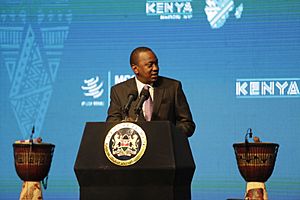
On 28 June 2018, Kenyatta announced a major effort to fight corruption. He said that no one would be safe from corruption charges. He even said his own brother should be charged if there was evidence against him.
Many officials were arrested on corruption charges during his presidency. These included the chairman of the National Land Commission and the managing director of the Kenya Railways Corporation. In 2019, Kenya's finance minister, Henry Rotich, was arrested for corruption. This was the first time a sitting minister had been arrested for corruption in Kenya.
In May 2020, 40 government workers and 14 private sector officials were arrested. These arrests were related to a big corruption case involving the National Youth Service. The government continued to work with anti-corruption groups to fight this problem.
International Relations

As president, Uhuru Kenyatta's relationships with other countries were often affected by the ICC case. At first, some Western countries were cautious about working with him. However, his relationships with them improved over time. He attended important summits in the US and the UK.
He was very active in African affairs. He pushed for more trade and economic independence among African nations. He also worked to reform the United Nations Security Council to give Africa a stronger voice. He successfully encouraged the African Union (AU) to oppose the ICC's actions against sitting African leaders.
Kenyatta helped negotiate peace agreements in South Sudan and the Democratic Republic of Congo. He also built strong relationships with the presidents of Uganda and Rwanda. They formed a group called the "Coalition of the Willing" within the EAC. This group worked on joint development projects, like a shared tourist visa.
He attended the funerals of important leaders like Nelson Mandela and President Michael Sata of Zambia. His government also developed closer ties with China, which helped fund many of Kenya's large building projects.
Post-Presidency Role
After his presidency ended in 2022, Uhuru Kenyatta continued to play a role in regional peace efforts. In 2025, he was appointed as a mediator by the East African Community and the Southern African Development Community. He is working to help resolve conflicts in the Democratic Republic of the Congo.
Awards and Honours
National Honours
Foreign Honours
 Barbados:
Barbados:
 Namibia:
Namibia:
 Serbia:
Serbia:
 Portugal:
Portugal:
 Grand Collar of the Order of Prince Henry (28 June 2022)
Grand Collar of the Order of Prince Henry (28 June 2022)
 Burundi:
Burundi:
Awards
- 2013, Youngest Kenyan President, Guinness World Records
- 2015, Africa's President of the Year 2014–2015, African Union
- 2015, ICTs in Sustainable Development Award, International Telecommunication Union
- 2017, Most Severe Plastic Bag Penalty, Guinness World Records
- 2017, Mandela Peace Prize, Mandela Institute of Paris
- 2018, Babacar Ndiaye Award, Africa Road Builders
- 2018, World 1st Blue Economy Conference Award, African Union Commission
- 2019, Political Leadership award for universal health coverage, African Union Access Challenge
- 2022, African Gender Award, African Union
See also
 In Spanish: Uhuru Kenyatta para niños
In Spanish: Uhuru Kenyatta para niños
- Presidency of Uhuru Kenyatta
- List of heads of state of Kenya
- 2013 Kenyan general election
- 2017 Kenyan general election


